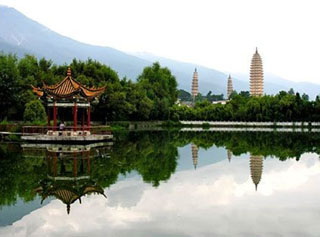
 China Tours
China Tours Tibet Tours
Tibet Tours China Theme Tours
China Theme Tours Off The Beaten Track
Off The Beaten Track Yangtze Cruises
Yangtze Cruises China Trip Planner
China Trip Planner Travel Agents
Travel Agents


We had a wonderful time in Tibet. We have learned a lot about this unique destination because of the wonderful guide Degyi who is so knowledge and always available towards our tours. We stayed at the Shangri-La Hotel Lhasa, and we would never imagine a Tibet travel could be so nice and amazing without the help of Degyi.
Also, thanks a lot to our Tibetan driver Mr.Wongdun for his safe driving and a good sense of service along the way.
We shall return Tibet in the near future!
P.B. and A. A - Europe
Tibet Travel
June 2018 (Private Tibet Journey from Kathmandu)

 Dali, a historically and culturally famous city of China, is renowned for her historical interest. During the Tang and Song Dynasties, it was the capital of Nanzhao and Dali Kingdoms, the political, economic and cultural centre of Yunnan, an important gateway of cultural exchange and trading with southeastern Asian countries, and an important pass of the ancient "Silk Route of the South". It has long enjoyed the reputation of "a land of letters".
Dali, a historically and culturally famous city of China, is renowned for her historical interest. During the Tang and Song Dynasties, it was the capital of Nanzhao and Dali Kingdoms, the political, economic and cultural centre of Yunnan, an important gateway of cultural exchange and trading with southeastern Asian countries, and an important pass of the ancient "Silk Route of the South". It has long enjoyed the reputation of "a land of letters". Dali is situated in the southwest of Yunnan and at the intersection of the Yunnan-Burma Highway and Yunnan-Tibetan Highway. It is 400 km. away from Kunming and one day's bus ride will bring you to Dali via Chuxiong Prefecture. Dali municipality covers an area of 1,457 square km. and is inhabited by 400 thousand people, composed of the Bai, Han, Hui, Yi, Lisu and other nationalities, among whom the Bai nationality makes up 64% of the total.
Dali City stands against Cangshan Mountain in the west and adjoins Erhai Lake in the east, and is embraced by undulating hills around. The elevation of the city proper is 1,974 metres. Dali is a highland city in low latitudes and its climate is of subtropical highland monsoon type. The weather is temperate, the annual mean temperature being 15 C and rainfall 1,078 mm. The monsoon season falls on June through October, and there is no marked seasonal changes in a year. Abundant sunshine makes the weather warm, but the wind is very strong, so Xiaguan of Dali is known as "A City of Wind."
As "a land of letters", Dali was the cradle of the Bai culture. In the long history of the past, the ancestors of the Bais and the Yis had created the brilliant Erhai Culture and left numerous illuminating historical and cultural relics. Within the boundaries of Dali, there are many ancient pagodas, steles, places of historical interest and frescoes. The ancient Dali City is still standing there elegantly and toweringly. The most outstanding places of interest in Dali are: the ancient city proper of Dali, the Three Pagodas on the ruins of Chongshengsi Monastery, Nanzhao Stele, the Tablet Commemorating Kublai khan's Conquest of Yunnan, the remains of Taihe City, the Tomb of Du Wenxiu, the scroll of pictorial history of Nanzhao (Tang Dynasty), Pictures on Buddhist themes Painted by Zhang Shengwan of Dali (Song Dynasty), and the Frescoes in Xingjiaosi Temple of Shaxi (Ming Dynasty). All these are the witnesses of the brilliant history of this ancient city.
Cangshan Mountain and Erhai Lake are the best scenic spots in Dali, which are reputed as the "Snow-covered Cangshan Mountains and Jade-Green Erhai Lake". Cangshan Mountain stands erect like a huge screen. Its snowcapped pinnacles and the streams in between under fleecy clouds make a beautiful picture. The placid and crystal clear Erhai Lake comprises the following famous scenic spots: the Three Islets, the Four Sand Bars, the Five Miniature Lakes and the Nine Curvatures. The magnificent Three Pagodas, the Lofty Cangshan Mountain and the Colourful Butterfly Spring add lustre to what is already beautiful. The Wind, Flowers, Snows and the Moon make a perfect natural picture that renders this ancient city even more attractive. So, people adorn it as "A Corner of Mother Nature" and "Switzerland in the East."
The folk ways of the minority nationality are richly colourful. The architectural layout of "Sanfang Yizhaobi" (a courtyard with rooms on three sides and a screen wall on the remaining side) and "Sihe Wutiangjing" (one big courtyard with four smaller ones at the corners of the main one) of the Bai nationality is elegant yet unsophisticated. "Every household has a water well and every family owns a number of potted flowers" are the tradition and common practice of the Bais. The attire of the Bai girls are brilliant and graceful, simple yet harmonious. The national minorities in the Dali area have many traditional festivals and gatherings, namely: the Benzhu Festival (worshipping the guardian saint or the local god of a Bai community), the Flower Festival, the March Fair, Raosanling Festival, Torchlight Festival and Lake Tour Festival. Among them, the March Fair is the most magnificent of all.
Dali today is full of vitality and prosperity in both the urban and rural areas. With the development in machinery, electricity, textile, chemicals, papermaking, tea processing, marble products and so on, it has now become an industrial base in the west of Yunnan Province. The mainstay in the economy of the city is the production of cigarettes, tea, marble articles, clothing, cement and electric power. The Dali marble, Tuocha (white tea), furniture, tie-dyed cloth, straw woven hats, and plywood are well known both at home and abroad. In agriculture, Dali mainly produces rice, wheat, broadbeans and maize. The species of rice "Dianyue No. 1" turns out 1,014 kilograms per mu (1/15 of a hectare) creating the highest record in China. And one crop of broad beans ranked the first in our country, yielding 514 kilograms per mu. In recent years, medicinal and perfuming crops are popularized. In sum, both in the city and around the countryside, Dali has become wealthy and prosperous, indeed a land of "fish and rice" in the west of Yunnan.
_______________________________________________________________________________________
Things To Do in Dali - Dali Attraction Guide
Erhai Lake
Dali Old Town
Xizhou Village
Zhoucheng Village
China Trip Planner | Travel Agents | About Us | Why Us | Contact Us | How to Pay | How to Book - Terms & Conditions | Site Map
Copyright © 2010 - 2030 All Rights Reserved.


 0086-28-85711328
0086-28-85711328 0086-28-85546015
0086-28-85546015




